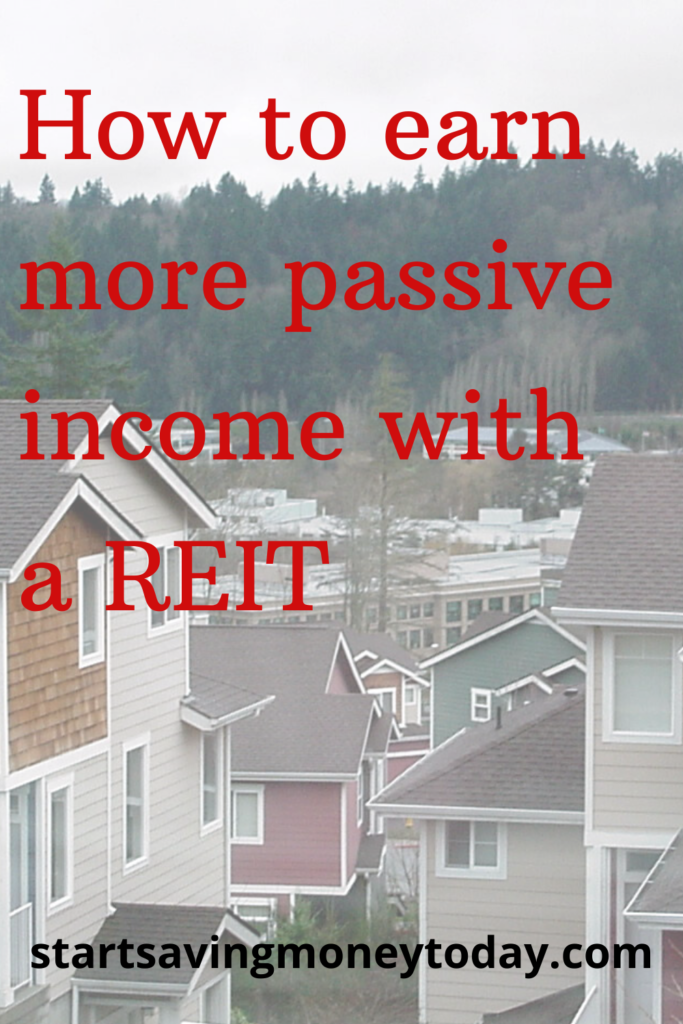Earn Passive Income, Real Estate
If you regularly read this blog, you know I’m always looking for a way to be more frugal. I search for ways to earn more money, to save money, and remain debt free. In this article, I will show you how you can make passive income from real estate, which can help you do all three. You’ll be surprised at how affordable it can be. You can earn passive income, real Estate may be your answer.
Passive income comes in varying forms. Consider your 401(k). You contribute money to it and that money makes more money. You receive free money; you didn’t earn it, your money did. You passively earn money while you sleep, watch TV, or do anything else. Earning a passive income on real estate is just as easy.
Earn Passive Income, Real Estate
Do you think it’d be nice to own a piece of property, such as a house or an apartment complex, and get paid by the tenants? Let’s explore that idea:
First, there’s the expense of purchasing property that’s habitable. It’s costly and you’ll be in debt for decades. (Not a frugal idea…) In addition, the you’ll need to pay taxes and insurance (more than one type), and upkeep expenses will occur regularly.
Second, managing real estate is a major undertaking. You must comply with the applicable laws: city and state ordnances, the health code, etc. Also, on purpose or not, some renters can be very difficult. Managing property is a full-time job and then some. If you’re thinking of buying rental property and collecting rent for the purpose of living the good life, you’re in for a rude awaking. It’s not as easy as it looks.
In contrast, the form of real estate investment I’m talking about isn’t like that. It comes without the headaches of being a landlord. An attractive alternative to purchasing real estate is an investment called REIT.
An alternative to buying real estate
REIT is an acronym for real estate investment trust and is sometimes called “real estate stock.” Basically, REITs are offered by investment firms that  own and manage a group of real estate properties and mortgages. Anyone can buy shares of publicly traded REITs.
own and manage a group of real estate properties and mortgages. Anyone can buy shares of publicly traded REITs.
REIT investment is much like a mutual fund. This means when you invest in a REIT share you become part owner of several, possibly many, properties. Your investment is diversified.
REITs can be purchased through most stockbrokers. You make an investment. Management and work are left to someone else. As a stockholder you have none of those responsibilities; you put your money to work for you.
How often is the payout and at what rate
The money an investor in REITs earns is proportional to how many shares they own. REITs pay dividends on a regular basis. This usually means quarterly, but there are some that pay monthly. This regular distribution is required for the investment companies to maintain a pass-through tax status. (I’ll address taxes shortly.)
The cost of getting involved with REITs
How much will it set me back to make this investment? That’s a good question. Cost could be an obstacle to getting into REITs. The initial investment is substantial—at least $1000, probably more. The amount can vary between companies. Your initial outlay depends on how you acquire the REIT. If you make the purchase through a stockbroker, it may cost more than if you purchase a mutual fund offering REITs as the major investment. There are platforms that could be more economical. Regardless, you need to shop around and ask about fees and how easy it is to access your money should you need it. (Keep reading: I’ll get add some more info on the possibility of a less expensive way to get into this type of investment.)
Choose what you invest in
There are several types of REITs. You can choose which is right for you. (Research and consideration are always important.)
REIT types…
Residential: Single family dwellings and other living facilities
Retail: Malls, strip malls and other shopping or entertainment venues
Lodging and resort: Travel and hospitality—hotels and resorts
Industrial: Warehouses and distribution centers.
Health care: Medical offices and complexes like hospitals and other affiliated properties
For example, if you believe that hospitals are a secure investment, that’s where you can put your money. You would want to invest in health care medical complex REITs.
One thing to be aware of when you invest in REITs is that you will probably be responsible for the taxes on the return your money brings you.
Taxes
Most companies that offer REITs as an investment option are pass-through companies. That means no taxes are paid at the corporate level for the  return on investment. Essentially, the investment company make its money on transaction fees. The tax burden on investment profit is on the investor. That might sound problematic until you realize that this eliminates double taxation. The investor receives larger dividends. Also, many REIT investments are taxed as ordinary income rather than as capital gains. That can be a major tax break.
return on investment. Essentially, the investment company make its money on transaction fees. The tax burden on investment profit is on the investor. That might sound problematic until you realize that this eliminates double taxation. The investor receives larger dividends. Also, many REIT investments are taxed as ordinary income rather than as capital gains. That can be a major tax break.
As with any other investment, do your research before taking action. It’s wise to check with your investment counselor or tax adviser. (Your finance expert is also a good source for more information on pass-through income,)
The short version
This has been a very condensed description REIT investment. For more information check out how REITs work.
A more affordable REIT
As I noted above, getting into REITs can be expensive if you do it through some of the major brokerage companies. The $1000 I mentioned is—definitely—on the low side. Somewhere between $3000 to $5000 is more common. There may also be some required qualifications with regard to a fairly high net worth and income.
Many people don’t want to put out that kind of money at one time. (“Can’t” may be a more accurate term.) That doesn’t mean they don’t want to be involved in this type of investment. In response to this several crowdfunding investment companies with REITs as their major focus have evolved. I’ll briefly discuss one: Fundrise.com.
Through Fundrise you can get involved with REITs (and efunds) for a $500 initial investment. That’s very reasonable. You never have to make another contribution, but you can add to your account in $100 increments whenever you wish.
As I’ve said, Fundrise is not the only real estate crowd funding company, but it seems to be the least expensive to get into. As with any new venture, I urge you to thoroughly research both the concept and any business promoting it. I’ve seen mixed reviews. One thing that became obvious is that REITs in general are meant to be long-term investments.
Use the keywords “real estate crowd funding” as a starting point for research. Note: Crowd funding began in the late 1990s and has only been a financial platform since 2000. About real estate, it is even more recent.
Conclusion
People look for ways to make their money work for them. One way to make that happen is to earn passive income from real estate. Rather than becoming a landlord and dealing with all the attendant complications, REITs (real estate investment trusts) are more convenient.
Using traditional investment platforms, purchasing REITs can be expensive. To make them available to more people, crowdfunding platforms for real estate have been developed. Some of these have initial contributions that are considerably lower than those required by long-established investment firms. Because this is a fairly new method for investing in real estate, anyone interested should do the research required to decide if they are comfortable with it. This should be done personally, and it never hurts to seek advice from investment professionals.


